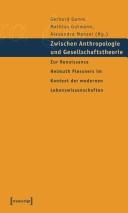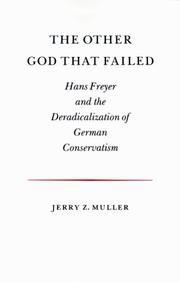| Listing 1 - 3 of 3 |
Sort by
|

ISBN: 3839403197 3899423194 Year: 2015 Publisher: Bielefeld transcript Verlag
Abstract | Keywords | Export | Availability | Bookmark
 Loading...
Loading...Choose an application
- Reference Manager
- EndNote
- RefWorks (Direct export to RefWorks)
Trotz seiner bedeutenden Beiträge zur Philosophischen Anthropologie und Sozialphilosophie ist das Denken Helmuth Plessners noch immer nicht ausgeschöpft. Dabei bieten seine Überlegungen zur exzentrischen Positionalität, zu Macht und menschlicher Natur, zu Ethik und Politik außerordentlich produktive Anschlüsse an heutige Debatten. Sie zeigen sich sowohl in Bezug auf ein gesellschaftskritisches Denken als auch im Blick auf »den Menschen« nach seinem viel beschworenen Ende. Gerade vor dem Hintergrund der Diskussionen um die Lebenswissenschaften und die neueren Biotechnologien sind seine Konzepte hochaktuell. Die Beiträge von G. Gamm, J. Fischer, G. Lindemann u.a. unternehmen den Versuch, Plessners Denken für die Philosophie, aber auch für die Sozial- und Kulturwissenschaften fruchtbar zu machen. »Der Wert [dieses] Bandes belegt [...], dass es eine ›Debatte‹ [um Plessner phiosophischer Anthropologie] in Gestalt vieler und unterschiedlicher Äußerungen gibt [und legt] mit der präzisen Formulierung ihrer zentralen systematischen Fragen und den grundsätzlichen Differenzen der Antwortvorschläge zugleich die aktuelle Reichweite und die Notwendigkeit dieser ›Debatte‹ als produktivem Streitgespräch [offen].« Jan Müller, www.literaturkritik.de, 07.10.2005
Philosophy --- German History of Philosophy. --- Human. --- Life. --- Philosophical Anthropology. --- Philosophy. --- Social Philosophy. --- Society. --- Anthropologie; Kultur; Leben; Helmuth Plessner; Mensch; Gesellschaft; Philosophische Anthropologie; Deutsche Philosophiegeschichte; Sozialphilosophie; Life Sciences; Philosophie; Culture; Life; Human; Society; Philosophical Anthropology; German History of Philosophy; Social Philosophy; Philosophy --- Plessner, Helmuth,
Book
ISBN: 9789042951396 9042951397 9789042951402 Year: 2023 Publisher: Louvain-la-Neuve: Peeters,
Abstract | Keywords | Export | Availability | Bookmark
 Loading...
Loading...Choose an application
- Reference Manager
- EndNote
- RefWorks (Direct export to RefWorks)
La vie est le concept, l’a priori objectif interne au vivant à titre de sens. Mais la vie est aussi le lieu d’inauguration de l’expérience du sujet. Cet ouvrage rend compte de leur unité. Helmuth Plessner a exposé le développement dialectique de cet a priori matériel par la notion de positionnalité, tandis que la phénoménologie du sentir d’Erwin Straus thématisera l’apparaître de la vie comme fond de l’expérience. La paternité de notre paradigme revient à Hegel. D’une part, il assigne au champ de l’affectivité du Soi, humain et animal, un rôle génétique d’où la conscience émerge. D’autre part, la vie, à travers l’organisation du vivant, fait entrer le spéculatif dans l’existence. Enfin, ambitionnant d’unifier la phénoménologie et l’approche dialectique de la vie, nous réhabiliterons trois sciences que Husserl et Heidegger reléguèrent dans le champ ontique pour mieux en abolir leur portée fondatrice: la psychologie, l’anthropologie philosophique et la biologie.
Philosophical anthropology --- Plessner, Helmuth --- Hegel, Georg W.F. --- Straus, Erwin --- Life. --- Philosophical anthropology. --- Phenomenology. --- Sense (Philosophy) --- Philosophie de l'homme. --- Vie. --- Phénoménologie. --- Sens et sensations. --- Awareness --- Hegel, Georg Wilhelm Friedrich, 1770-1831 --- Plessner, Helmuth, 1892-1985 --- Straus, Erwin W. (Erwin Walter), 1891-1975 --- Hegel, Georg Wilhelm Friedrich --- Helmuth Plessner

ISBN: 0691055084 0691228256 Year: 1987 Publisher: Princeton, N.J. Princeton University Press
Abstract | Keywords | Export | Availability | Bookmark
 Loading...
Loading...Choose an application
- Reference Manager
- EndNote
- RefWorks (Direct export to RefWorks)
Why did some of the "best and brightest" of Weimar intellectuals advocate totalitarian solutions to the problems of liberal democratic, capitalist society? How did their "radical conservatism" contribute to the rise of National Socialism? What roles did they play in the Third Reich? How did their experience of totalitarianism lead them to recast their social and political thought? This biography of Hans Freyer, a prominent German sociologist and political ideologist, is a case study of intellectuals and a "god that failed"--not on the political left, but on the right, where its significance has been overlooked. The author explores the interaction of political ideology and academic social science in democratic and totalitarian regimes, the transformation of German conservatism by the experience of National Socialism, and the ways in which tension between former collaborators and former opponents of National Socialism continued to mold West German intellectual life in the postwar decades.
Freyer, Hans --- Konserwatyzm --- Radykalizm --- Intelektualiści --- Socjologia --- Activism. --- Adolf Hitler. --- Antipathy. --- Arnold Gehlen. --- Bildung. --- Bourgeoisie. --- Capitalism. --- Career. --- Carl Schmitt. --- Communism. --- Contemporary society. --- Criticism. --- Critique. --- Denazification. --- Dilthey. --- Disenchantment. --- Ernst Forsthoff. --- Ernst Troeltsch. --- Ethics. --- Ethos. --- Explanation. --- Far-right politics. --- Federal republic. --- Foreign policy. --- Gemeinschaft and Gesellschaft. --- Georg Simmel. --- Gerhard Ritter. --- Germans. --- Gleichschaltung. --- Habilitation. --- Hans Freyer. --- Hans-Georg Gadamer. --- Helmut Schelsky. --- Helmuth Plessner. --- Historicism. --- Historiography. --- Ideology. --- Institution. --- Intellectual. --- Intelligentsia. --- Karl Mannheim. --- Konrad Adenauer. --- Lebensphilosophie. --- Lecture. --- Left-wing politics. --- Liberal democracy. --- Liberalism. --- Martin Broszat. --- Martin Heidegger. --- Marxism. --- Modernity. --- Nazi Germany. --- Nazi Party. --- Nazism. --- Of Education. --- Pedagogy. --- Philosopher. --- Philosophy of history. --- Philosophy. --- Political philosophy. --- Political science. --- Politician. --- Politics. --- Positivism. --- Privatdozent. --- Publication. --- Radical right (United States). --- Ralf Dahrendorf. --- Religion. --- Right-wing politics. --- Romanticism. --- Secularization. --- Self-interest. --- Social philosophy. --- Social science. --- Social theory. --- Sociological theory. --- Sociology. --- Soziologie. --- Suggestion. --- Superiority (short story). --- Supporter. --- Tatkreis. --- Technology. --- The God that Failed. --- Theodor. --- Theory. --- Thought. --- Totalitarianism. --- Volksgeist. --- Von. --- Weimar Republic. --- Welfare state. --- Werner Sombart. --- West Germany. --- Wissenschaft. --- World history. --- World view. --- Writing. --- Émile Durkheim. --- Germany --- Intellectual life
| Listing 1 - 3 of 3 |
Sort by
|

 Search
Search Feedback
Feedback About UniCat
About UniCat  Help
Help News
News